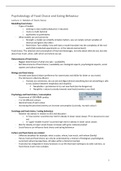Psychobiology of Food Choice and Eating Behaviour
Lecture 1: Models of food choice
Modelling food choice
- Types of models
o existing vs new models (deductive / inductive)
o mono vs multi-factorial
o qualitative vs quantitative
- What models can and cannot do
o Strength: a model can simplify complex matters, you can isolate certain variables of
interest and ignore the others
o Restriction: Face validity: how well does a model translate into the complexity of the real
world (lab conducted experiments vs. in the natural environment)
Food choice: The selection and consumption of food and beverages, not only about what we eat, but also
about how much, when, with whom and where we eat.
Determinants of food choice
- Biggest determinant of what one eats = availability
- But determinants of food choice / availability are: biological aspects, psychological aspects, social
aspects and cultural aspects
Biology and food choice
- (Innate) taste biases (inborn preference for sweet taste and dislike for bitter or sour taste)
- The Omnivore’s dilemma (Rozin)
o Humans are omnivores, we can eat and digest almost everything but not everything is safe
to eat, balance between neophobia and neophilia
▪ Neophobia = persistence to try out new food (can be dangerous)
▪ Neophilia = natural curiosity towards new foods (variety in our diet)
Psychology and food choice / consumption
- Assortment of 300 M&M candies
- 7 or 10 different colours
- Identical taste of each colour
- Increasing the perceived variety can increase consumption (curiosity, try each colour)
Sociology and food choice / eating behaviour
- Relative risk obesity in relation to SES and education
o In ‘low-income’-countries low risk for obesity in lower social classes → no resources to over
eat
o In ‘upper-middle-income’-countries high risk for obesity in lower social classes
- Risk for obesity in lower social classes increases with gross national product
- Social factors can influence food choice and eating behaviour
Culture and food choice are related
- Different breakfast for example: what is eaten, where, how much, with whom (family)
- Hence, food and food choice can only be understood by a mixture of biological, psychological,
social and cultural perspectives, all taken within a historical context
- Food also has integrated in many functions in our life that have nothing to do with nutrition, so
food choice much more complex
1
,Food Choice Models - Food choice process model over the life course
As people develop and change over time, they are shaped by their environment and experience. They
construct an individual life course that involves past and current food choice, eating behaviours and
experiences as well as expectations about the future food choices and experiences. In this model, food
choice is seen as dynamic and something that evolves over time.
Food Choice Models - Food choice process model over the life course
- Qualitative study by Devine and colleagues (1998)
- Life-course (personal and environmental) influences on fruit and vegetable trajectories
- Interviewed about determinants of fruit and vegetable intake, how these things changed over the
life-course and what are the factors that cause these changes
Food Choice Models – important forces
- Food upbringing
o positive experiences → living on a farm, having a vegetable garden
o negative experiences → being forced to eat vegetables as a child
- Roles and role transitions (different households)
o marriage, divorce, employment, childbearing
- Health
o acute and/or chronic illnesses, aging, self / others
- Ethnic traditions
- Resources
o perceived knowledge/skills, available time, space, money, access to stores
- Food system
o changing health and diet information, cultural trends in cuisine
2
, Food Choice Models - Food choice process model over the life course
How people construct food choices over time, one central concept is the individual food choice trajectory.
These trajectory includes person’s persist thoughts, feelings, strategies and actions over the life spend. For
example, a person may grow up with the family tradition of eating fish several times per week and this
person may continue to do so most of his/her life. The food trajectory of life long regular fish eaters may
differ from those who only begin to appreciate fish as adults. When life changes occur this will likely effect
the fish eating patterns of the adult eaters more easily than the lifelong fish eaters. Along the individual
trajectory, one can identify transitions. Transitions are shifts in a person’s life that lead to minor changes in
food choice patterns (moving from one job to another; different lunch canteen with different product
available). Someone’s discission to become
vegetarian has a major impact on your
food choice pattern. Apart from these
transitions and turning points, there is
context that represents the environments
in which life course changes occur, both at
macro (e.g. government reduces salt
content in bread) and micro (when family
decides to have their own vegetable
garden) level.
Food Choice Models - Food choice process model over the life course
Next level in this model where the life course provides a frame work for a variety of influences on our food
choices. These influences of this model are clustered into five groups: ideals or normative standards about
what and how want you to eat and this is often very much ingrained in cultural norms. The ideal meal of
elderly Dutch people matches something like meat potatoes and
vegetables, a normative standard of what a good meal
should be. Personal factors involve a broad range of
physiological and psychological or emotional characteristics of
the person that have an effect on food choice and food
preferences. Resources are things like budget, time, cooking
skills and transportations. Social factors means the
relationships we have with other people. Context refers to
micro and macro level, the broader environment in which
people make choices.
Food Choice Models - Food choice process model over the life course
Personal Food System = Translations of influences on individual food choices into how and what one eats in
particular situations.
3




